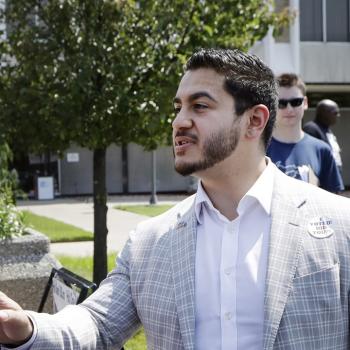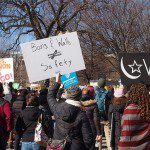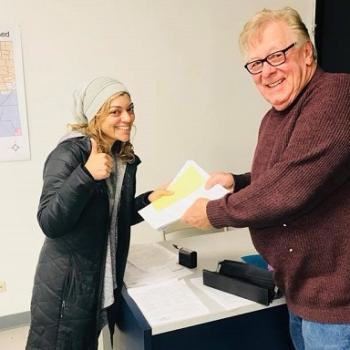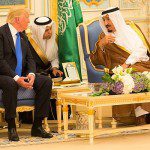 |
|
Ramadan road trip
|
Despite the increasing attention that Muslim Americans face in the days of contested Islamic centers and threatened Qur’an burnings, very few outside the community (and even some within it) have an accurate picture of the ethnic, economic, and geographic diversity of the Muslim American community. Last year, twenty-something New Yorkers Aman Ali and Bassam Tariq decided to spend their Ramadan exploring New York to find answers with their 30 Mosques in 30 Days project. This year, the duo decided to up the ante with 30 Mosques in 30 States, which took the pair on a 13,000-mile journey that has kept readers and the mainstream media captivated. We caught up with “30 Mosques” co-founder Bassam Tariq while he was riding shotgun during the last leg of the tour, and ask him about spending the day with famous Katrina survivor Abdulrahman Zeitoun, visiting a century-old Muslim graveyard and home of the oldest mosque in America, and discovering just how many mosques seeking expansion have coincidentally run into permitting problems.
![]() Tell us a little bit about why you decided to do this project.
Tell us a little bit about why you decided to do this project.
BASSAM TARIQ: Last year we did “30 Mosques in 30 Days” within New York City, and it was great, and we felt fulfilled afterwards. We threw out the idea of “30 Mosques in 30 States”, but it really wasn’t until a few weeks before Ramadan, and Aman decided that if he could get 30 days off of work, he would be interested. I wasn’t that interested at the time because I was afraid we would run into communities with big chandeliers and motion-sensor wudu stations, and that would make for some really boring stories. It’s an important narrative, but it’s just not compelling enough. We thought that what we had in New York [last year] was so unique that we wouldn’t find that anywhere else.
We needed some money for the project, so Aman puts out a message on Facebook asking people for $30 each so that we would have enough money for the trip. Within a week, we were able to raise the money. I thought, “We are still relevant, this is still important, we can do this.” Aman did a lot of the planning while I was in Pakistan, and three days after I returned, we left on the trip.
We made a pact that if we see something that is a lot more interesting than the communities we were hitting up that we would go there, because we were so afraid of running into the same cookie-cutter mosques. God be thanked, not a day has been the same – every day something interesting has unfolded in front of us. You can’t write that, it just happens. Sometimes, the way things unfold, it’s just incredible.
![]() This particular trip you’re taking happens at a particularly interesting time because it coincides with a national debate, not just about the community center in lower Manhattan, but about Muslims in America. How did that inform both your journey as well the reaction of Muslims to what you’re doing?
This particular trip you’re taking happens at a particularly interesting time because it coincides with a national debate, not just about the community center in lower Manhattan, but about Muslims in America. How did that inform both your journey as well the reaction of Muslims to what you’re doing?
Some of the communities were a little afraid, understandably. For example, in Mobile, Alabama, we wanted to go to a community that had their own set of issues that they were dealing with. The mosque president’s son was indicted for terrorism charges and deported last year, and a media frenzy followed. So we show up unannounced – we tried to contact them for quite a while – along with two guys from CNN, and they kick us out, and rightfully so.
There have been times where we call communities trying to get in touch with them, and they weren’t so sure about this, but when we finally get there they usually open up. A couple of mosques we visited are having problems with expansion. One community in Pennsylvania, the Bawa Muhaiyudeen Fellowship, is a predomininantly white community of Muslims that is trying to get clearance in order to build a school, and they need permits but aren’t getting it. It’s frustrating for them because they’ve had great relationships with the local city officials for years, but now they don’t know what’s wrong.
Another community in Arizona has built an enormous mosque just off the highway, but recently the city has been giving them trouble with permit and parking issues when they hadn’t before. The president of the mosque thinks it is because of the controversy [in New York].
There are a few positive stories as well – a community in Memphis, Tennessee has a great relationship with an evangelical church which has come out in support of their project. It’s always good to talk about these because we don’t hear about it enough. Nearly every mosque we visited has some sort of expansion plan because their communities are getting bigger.
![]() Even more interesting than the stories of these mosques are the stories of the people you’ve met, both Muslim and non-Muslim. I was particularly taken by your visit to a Confederate store. Tell us about that.
Even more interesting than the stories of these mosques are the stories of the people you’ve met, both Muslim and non-Muslim. I was particularly taken by your visit to a Confederate store. Tell us about that.
Everyone told us that when we got to the South we would see a huge Confederate flag by the side of the freeway. Aman called it “too racially awesome to pass up”. We had two CNN guys with us, and the videographer Robert, who is black, said, “I don’t know how I feel about this.” When we get in, we see these guys smiling at us, and the owner Robert was really nice to us. He didn’t want us to paint a picture of him being a racist, but at the end of the day I still think for him to have that flag up is problematic.
![]() Tell us about visiting with Abdelrahman Zeitoun, the subject of Dave Eggers’ book “Zeitoun”.
Tell us about visiting with Abdelrahman Zeitoun, the subject of Dave Eggers’ book “Zeitoun”.
That was one of the highlights of my trip. What Zeitoun doesn’t say is what makes him such a badass. I got his contact from you, and I called up his wife, who invited me to the masjid to meet him. I see a short Arab man walking towards me – for a second I was expecting a 6′-2″ guy, but he was this great cuddly teddy bear. It was great to be around him – he is very unassuming and understated. I spent the entire day with the guy, and he took me to all these job sites and cracked jokes with his workers – very subtle jokes. When you finally get them, you think, “He is really smart”.
When we were there, the contractors would see us taking photos and ask, “Is this for the movie?” I had forgotten for a second that there is a movie being made about him by filmmaker Jonathan Demme. When you go to his house, you see storyboard frames from the movie laying around. I tell him, “This is really incredible,” but Zeitoun didn’t seem to care. Nothing’s changed for him.
Here’s where he really stole my heart – every time I tried to bring up the book or the movie, he didn’t want to talk about it. But when I brought up the masjid, he just brightened up. His mind is on his community. For him, the book happened, but life is still the same. That’s the way he is. I really fell in love with the guy and his family.
![]() I want to ask you about your visit to Ross, North Dakota. I don’t think any of your readers were expecting to see what you found there.
I want to ask you about your visit to Ross, North Dakota. I don’t think any of your readers were expecting to see what you found there.
Our car broke down in Montana, and we didn’t have enough time to get to Fargo, which was an 11 hour drive. So we needed something that was a lot closer, we were worried about getting somewhere before maghrib, and Ross was the only option. We had no contact with anyone, and we knew nothing other than that there was some semblance of a mosque or cemetery, and these settlers came from Syria and settled there, and now their gravesites are there. We said “Bismillah, we’ll find it” and drove.
We get in contact with a local pastor, who confirms there is a cemetery there, and gives us the address and a phone number of someone to get in touch with. We get in touch with the lady, who is a bit apprehensive, and we finally get to the gravesite, which is incredible and majestic. They built a small little mosque, which is more like a landmark for the area, and we took some great pictures.
In the morning, we finally had a chance to meet with Lila and her son, who live at a farm near the mosque. She was this incredible lady who has gone through so much – she was the “dark kid” at school, with only 5 people in her graduating class, with lots of issues being Muslim growing up. This is a very different Muslim identity crisis than the ones we went through. Her sharing that story with us was incredible. To know that we’ve been here this long is very fulfilling. It makes me feel that we have been a part of this country for quite a long time.
![]() What happens next? Do you turn this into a book? How do you plan on taking this to the next level, if at all?
What happens next? Do you turn this into a book? How do you plan on taking this to the next level, if at all?
Our big thing right now is to get the blog together. I want to make sure we are compiling things the right way and make it a better experience, because I want to make sure that whatever we have on the site is here to stay. We’re not historians or academics, but these stories are important and I want to make sure we preserve these. Another thing we’re thinking about is doing some speaking engagements, and we’ve already been contacted by some people.
As for next year, “30 Mosques in 30 Countries” or whatever, I don’t know. At this point, I just want to go home and see my parents; I haven’t been in Texas for quite a while. Every day we are on the road, every day I am not spending with my family, it’s got to be worth it. I can’t just be on the road listening to the radio. That’s what has been driving both of us.
Shahed Amanullah is editor-in-chief of altmuslim.com











